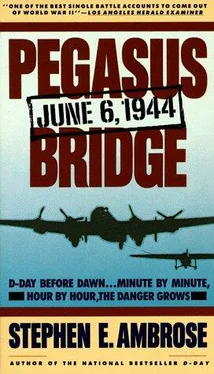Stephen Ambrose - Pegasus Bridge
Здесь есть возможность читать онлайн «Stephen Ambrose - Pegasus Bridge» весь текст электронной книги совершенно бесплатно (целиком полную версию без сокращений). В некоторых случаях можно слушать аудио, скачать через торрент в формате fb2 и присутствует краткое содержание. Жанр: История, на английском языке. Описание произведения, (предисловие) а так же отзывы посетителей доступны на портале библиотеки ЛибКат.
- Название:Pegasus Bridge
- Автор:
- Жанр:
- Год:неизвестен
- ISBN:нет данных
- Рейтинг книги:5 / 5. Голосов: 1
-
Избранное:Добавить в избранное
- Отзывы:
-
Ваша оценка:
- 100
- 1
- 2
- 3
- 4
- 5
Pegasus Bridge: краткое содержание, описание и аннотация
Предлагаем к чтению аннотацию, описание, краткое содержание или предисловие (зависит от того, что написал сам автор книги «Pegasus Bridge»). Если вы не нашли необходимую информацию о книге — напишите в комментариях, мы постараемся отыскать её.
Pegasus Bridge — читать онлайн бесплатно полную книгу (весь текст) целиком
Ниже представлен текст книги, разбитый по страницам. Система сохранения места последней прочитанной страницы, позволяет с удобством читать онлайн бесплатно книгу «Pegasus Bridge», без необходимости каждый раз заново искать на чём Вы остановились. Поставьте закладку, и сможете в любой момент перейти на страницу, на которой закончили чтение.
Интервал:
Закладка:
Eisenhower cited the Allied experience at Anzio early in 1944 as an example. They had landed there in an attempt to slip around the German line in Italy, thereby threatening both the rear of the German line and Rome itself. Eisenhower told Marshall that 'any military man required to analyse' the situation in Italy right after the Anzio landing 'would have said that the only hope of the German was to begin the instant and rapid withdrawal of his troops'. Instead the Germans attacked, and because the Anzio force did not have enough tanks and trucks to provide mobile striking power, the Allies barely held out. And they held out, Eisenhower emphasised, only because the Allies had command of the sea and could provide support in both material and gunfire directly onto the beachhead. An inland airborne force would be cut off from all but air supply, which could not provide enough tanks, trucks, heavy artillery, or bulldozers and other equipment to withstand German armoured attacks. It would be annihilated.
Eisenhower was unwilling to take the risk Marshall proposed. He believed that paratroopers dropped near Evreux would not be a strategic threat to the Germans, that indeed they would just be paratroopers wasted, and might even be made a hostage, just as the Anzio force had become. 'I instinctively dislike ever to uphold the conservative as opposed to the bold', Eisenhower concluded, but he would not change his plans. Marshall did not raise the subject again.
Nothing like Marshall's plan was ever tried. At Arnhem, in September, 1944, three airborne divisions were used, but they were dropped many miles apart with separate objectives. Therefore we cannot know who was correct, Eisenhower or Marshall. But Eisenhower was in command, so it was his plan -admittedly conservative rather than bold - that was used.
Thus did the British 6th Airborne Division get its D-Day assignment. The task of carrying out that assignment fell to General Richard Gale, commander of the 6th Airborne. Gale decided to drop his division east of the Orne River, about five to seven miles inland, in the low ground between the Orne and the River Dives. The main body would gather in and around the village of Ranville, and would guard the bridges over the Orne Canal and River. Specially-trained companies would capture and destroy the four bridges over the River Dives, then fall back on Ranville; others would destroy the German battery at Merville.
Central to Gale's plan was taking and holding the bridges over the Orne waterways, without which the 6th Airborne would be unable to receive tanks, trucks, and other equipment from the beaches. They were critical to the success of the whole invasion, and the operation to take and hold them would require meticulous planning, rigorous training, and bold execution.
That operation is the subject of this book.
CHAPTER ONE
D-Day:0000 to 0015 hours
It was a steel girder bridge, painted grey, with a large water tower and superstructure. At 0000 hours, June 5/6, 1944, the scudding clouds parted sufficiently to allow the nearly-full moon to shine and reveal the bridge, standing starkly visible above the shimmering water of the Caen Canal.
On the bridge. Private Vern Bonck, a twenty-two-year-old Pole conscripted into the German army, clicked his heels sharply as he saluted Private Helmut Romer, a sixteen-year-old Berliner who had reported to relieve him. As Bonck went off duty, he met with his fellow sentry, another Pole. They decided they were not sleepy and agreed to go to the local brothel, in the village ofBenouville, for a bit of fun. They strolled west along the bridge road, then turned south at the T junction, on the road into Benouville. By 0005 they were at the brothel, and within minutes they were knocking back cheap red wine with two French prostitutes.
Beside the bridge, on the west bank, south of the road, Georges and Therese Gondree and their two daughters slept in their small cafe. Georges and Therese were in separate rooms, not by choice but as a way to use every room and thus to keep the Germans from billeting soldiers with them. It was the 1,450th night of the German occupation ofBenouville.
So far as the Germans knew, the Gondrees were simple Norman peasants, people of no consequence who gave them no trouble. Indeed, Georges sold beer, coffee, food, and a concoction made by Madame of rotting melons and half-fermented sugar, to the grateful German troops stationed at the bridge. There were about fifty of them, the NCOs and officers all German, the enlisted men mostly conscripts from East Europe.
But the Gondrees were not as simple as they pretended to be. Madame came from Alsace and spoke German, a fact she successfully hid from the garrison. Georges, before acquiring the cafe, had spent twelve years as a clerk in Lloyd's Bank in Paris and spoke English. Both hated the Germans for what they had done to France, hated the life they led under the occupation, feared for the future of their eight-year-old daughter, and were consequently active in trying to bring German rule to an end. In their case, the most valuable thing they could do for the Allies was to provide information on conditions at the bridge. Therese got information by listening to the chit-chat of the NCOs in the cafe; she passed what she heard along to Georges, who passed it to Madame Vion, director of the maternity hospital, who passed it along to the Resistance in Caen on her trips to obtain medical supplies. From Caen, the information was passed onto England via Lysander aeroplanes, small craft that could land in fields and get out in a hurry.
Only a few days before, on June 2, Georges had sent through this process a titbit Therese had overheard - that the button that would set off the explosives to blow the bridge was located in the machine-gun pillbox across the road from the anti-tank gun. He hoped that information had got through, if only because he would hate to see his bridge destroyed.
The man who would give that order, the commander of the garrison at the bridge, was Major Hans Schmidt. Schmidt had an understrength company of the 736th Grenadier Regiment of the 716th Infantry Division. At 0000 hours, June 5/6, he was in Ranville, a village two kilometres east of the Orne River. The river ran parallel to the canal, about 400 metres to the east, and was also crossed by a bridge (fixed, and guarded by sentries but without emplacements or a garrison). The Germans knew that the long-anticipated invasion could come at any time, and Schmidt had been told that the two bridges were the most critical points in Normandy because they provided the only crossings of the Orne waterways along the Norman coast road.
Nonetheless, Schmidt did not have his garrison at full alert; nor was he in Ranville on business. Except for the two sentries on each bridge, his troops were either sleeping in their bunkers, or dozing in their slit trenches or in the machine-gun pillbox, or enjoying themselves at the Benouville brothel.
Schmidt himself was with his girlfriend in Ranville, enjoying the magnificent food and drink of Normandy. He thought of himself as a fanatical Nazi, someone who was determined to do his duty for his Flihrer, but he seldom let duty interfere with pleasure, and he had no worries that evening. His routine concern was the possibility that French partisans might blow the bridges, but that hardly seemed likely except in conjunction with an airborne operation, and the high winds and stormy weather of the past two days precluded a parachute drop. Having received orders to blow the bridges himself if capture seemed imminent, he had prepared the bridges for demolition. But he had not put the explosives into their chambers, for fear of accident or the partisans. As his bridges were almost five miles inland, Schmidt reckoned he would have plenty of warning before any Allied units reached him, even paratroopers, because the paras were notorious for taking a long time to form up and get organised after their drops scattered them all over the DZ. Thus, tonight Schmidt could relax. He treated himself to more wine, and another pinch.
Читать дальшеИнтервал:
Закладка:
Похожие книги на «Pegasus Bridge»
Представляем Вашему вниманию похожие книги на «Pegasus Bridge» списком для выбора. Мы отобрали схожую по названию и смыслу литературу в надежде предоставить читателям больше вариантов отыскать новые, интересные, ещё непрочитанные произведения.
Обсуждение, отзывы о книге «Pegasus Bridge» и просто собственные мнения читателей. Оставьте ваши комментарии, напишите, что Вы думаете о произведении, его смысле или главных героях. Укажите что конкретно понравилось, а что нет, и почему Вы так считаете.




![Stephen Ambrose - Citizen Soldiers [Condensed]](/books/346737/stephen-ambrose-citizen-soldiers-condensed-thumb.webp)




